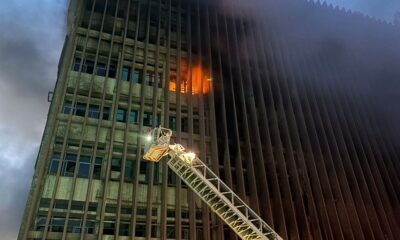Middle East
The Arab plan for Gaza has two problems: Israel and the PA | Opinions

Egypt’s proposal for the reconstruction and administration of Gaza has emerged as an urgent intervention in the crisis that has unfolded since October 7, 2023. Backed by the Arab states, the Organisation of Islamic Cooperation, and several European nations, the plan is not merely a humanitarian initiative — it is a geopolitical manoeuvre meant to counter the scheme being pushed by Israeli Prime Minister Benjamin Netanyahu, and recently backed by United States President Donald Trump, to depopulate the Gaza Strip.
For several months, Arab states hesitated to step into the role of rebuilding and governing Gaza without a comprehensive initiative to address the core issue of Palestinian statelessness. Effectively, they were resisting being drawn into the role of a Palestinian Authority (PA) 2.0, shouldering Israel’s responsibilities as an occupying force while Israelis continued their colonial expansion in the West Bank. Yet, the existential threat posed by Trump and Netanyahu’s vision for Gaza has forced them into action.
At its core, Egypt’s $53bn reconstruction plan relies on the establishment of a local steering committee composed of technocrats for the first six months, with a transition to PA control thereafter. But this approach carries fundamental problems that could doom the plan to failure before it is even implemented.
Netanyahu’s obstructionism
The Israeli prime minister has been clear in his opposition to any role for the PA in Gaza. His stance is strategic: allowing the PA to administer the territory would open the door for geopolitical unity between Gaza and the West Bank, a stepping stone to renew negotiations for a Palestinian state.
For decades, Netanyahu and Israel’s political establishment have worked to prevent any scenario that could lead to Palestinian self-determination. The status quo of fragmentation and division between Palestinian territories serves their interests, keeping the goal of statehood perpetually out of reach.
To effectively counter Netanyahu, the Arab states need the buy-in of as many other actors as possible, especially the Trump administration, which has the leverage to force the Israeli premier to accept.
While Netanyahu may still seek to undermine its implementation through imposing bureaucratic hurdles, military escalations, or economic restrictions — part of a well-worn Israeli playbook — the Arab plan remains the best option on the table to prevent the ethnic cleansing of Gaza through renewed warfare and long-term deprivation.
A PA in crisis
Beyond Israeli resistance, there is another major barrier to implementing the Arab plan: the PA. Under President Mahmoud Abbas, it is a deeply unpopular institution, lacking political relevance after the collapse of the Oslo Accords.
Over the years, Abbas has accelerated the erosion of its legitimacy by continuing security coordination with Israel, deepening his authoritarian rule, and refusing to hold elections since 2006. His leadership has been increasingly defined by repression — of opposition factions, of political renewal, and of any resistance to Israeli aggression.
Without a viable political process, the PA has become an appendage of Israel’s occupation and apartheid, enforcing security in the West Bank while lacking any real authority to govern as an independent entity. This has fuelled widespread Palestinian disillusionment. Abbas’s grip on power has necessitated an increasingly heavy hand, particularly against activists and factions calling for a more confrontational approach to Israeli policies of ethnic cleansing.
The PA’s failure has been especially glaring in the past 16 months of Israel’s genocidal assaults on Gaza and the West Bank. Abbas has been largely absent from efforts to mobilise Palestinian resistance, his silence and inaction reflecting his obsolescence.
His government has not only lost the confidence of the Palestinian people but has also become largely irrelevant to the broader geopolitical players, including Israel, the US, and Arab states.
A political vacuum
Abbas’s reliance on Israel and the PA’s international donors to keep the authority afloat forces him to prioritise their demands over those of his people, which largely run contrary to each other. As his domestic popularity has subsequently plummeted, his authoritarianism has become more severe.
Most recently, he initiated a crackdown on Palestinian resistance groups in the northern West Bank city of Jenin and eliminated financial support for families of Palestinians imprisoned, killed, or wounded by Israel.
This move, breaking a longstanding social compact between the Palestinian people and their leadership, has only underscored the extent to which the PA seeks to appease Israel and the West at the expense of legitimacy at home.
Now, faced with an urgent need for Palestinian governance in Gaza, the Arab states find themselves without a real, viable partner. The existing PA leadership is weak, corrupt, and likely incapable of administering the Strip effectively.
Some within the Arab world, as well as Palestinian civil society and the diaspora, are pushing for new leadership. However, Abbas and his loyalists have resisted any such efforts. In mid-February, the PA prevented 33 delegates to a Palestinian national conference being held in Doha — which was billed as a grassroots effort to revive the Palestine Liberation Organization (PLO) — from leaving the West Bank.
At the same time, in a bid to accommodate Arab government opposition, Abbas has extended an amnesty offer to disaffected members of Fatah, particularly Mohammed Dahlan, his UAE-backed rival who has lived in exile in Abu Dhabi.
Dahlan’s potential return could signal a shift in Palestinian leadership dynamics, but it would not solve the core crisis of legitimacy afflicting the PA. A political reshuffling at the top is not the same as systemic reform, and without a broader commitment to national unity and representational renewal, any new leadership structure risks inheriting the same failures that have defined Abbas’s tenure.
A moment of opportunity
The reconstruction of Gaza presents an opportunity to lay the groundwork for a renewed Palestinian national movement by breaking Abbas’s stranglehold over Palestinian politics and jumpstarting the process of its revitalisation. If the Arab states can navigate the political minefield of Netanyahu’s intransigence, Abbas’s self-interest, and internal Palestinian divisions, they might be able to steer Gaza towards a more stable and autonomous future.
However, if Abbas and his circle of entrenched officials remain in control, this effort could quickly devolve into another failed attempt at Palestinian reconciliation, reinforcing the status quo of Israeli dominance and Palestinian disunity.
Gaza’s future hangs in the balance. This intervention by Arab states could be a positive step towards Palestinian self-determination — or it could become a historic missed opportunity. If Abbas continues to monopolise power, if the PLO remains a hollow shell, and if Netanyahu continues his campaign to sabotage any form of Palestinian sovereignty, then the Arab plan may be dead on arrival.
This moment calls for decisive action, for Palestinian political renewal, and for an international commitment to genuine Palestinian self-determination. Whether the Arab states’ plan can overcome the structural obstacles in its path remains to be seen. But if the Palestinians’ leadership crisis has not already sealed Gaza’s fate, then now is the time for a course correction before it is too late.
The views expressed in this article are the author’s own and do not necessarily reflect Al Jazeera’s editorial stance.
Middle East
Iran’s Khamenei slams US nuclear proposal, vows to keep enriching uranium | Nuclear Energy News

Iranian supreme leader says issue of uranium enrichment remains key to Tehran’s pursuit of energy independence.
Iranian Supreme Leader Ayatollah Ali Khamenei has pledged that Tehran will not abandon its uranium enrichment, rejecting a key demand in a United States proposal aimed at resolving a long-running dispute over Iran’s nuclear programme.
The comments were delivered in a speech on Wednesday as the US and Iran continue to negotiate the details of a possible new nuclear deal. The issue of uranium enrichment has remained a sticking point in the talks, with the US reportedly demanding a complete halt or low-level enrichment in exchange for the lifting of Western sanctions against Tehran.
“The US nuclear proposal contradicts our nation’s belief in self-reliance and the principle of ‘We Can,’” Khamenei said in his speech delivered on the commemoration of the death of the Islamic Republic’s founder, Ayatollah Ruhollah Khomeini, in 1989.
Khamenei said the issue of uranium enrichment remained key to Iran’s pursuit of energy independence.
“Independence means not waiting for the green light from America and the likes of America,” he said, adding that the US proposal was “100 percent against” the ideals of the 1979 Islamic revolution.
He said Tehran would not seek Washington’s approval for its decisions.
“Some people think that rationality means bowing down to America and surrendering to the oppressive power; this is not rationality,” Khamenei said.
“Why are you interfering in whether Iran should have enrichment or not? You cannot have a say.”
On Tuesday, Iranian President Masoud Pezeshkian also said that Tehran “would not abandon” the country’s scientific and nuclear rights, while disavowing nuclear weapons.
He said that those accusing Iran “are proliferating” weapons of mass destruction and destabilising the region with deadly weapons.
On Monday, the Reuters news agency had reported that Tehran was poised to reject the latest US proposal to end a decades-old nuclear dispute, quoting an unnamed diplomat as saying the proposal was a “non-starter” that fails to soften Washington’s stance on uranium enrichment or to address Tehran’s interests.
Tehran said it wants to master nuclear technology for peaceful purposes and has long denied accusations by Western powers that it is seeking to develop nuclear weapons.
US envoy Steve Witkoff, who heads the American delegation in talks with Iran, has said President Donald Trump opposes Tehran continuing any enrichment, calling it a “red line”.
A leaked United Nations report shows that Iran has ramped up production of enriched uranium near weapons-grade by 50 percent in the last three months. It is still short, however, of the roughly 90 percent required for atomic weapons, but still significantly above the 4 percent or so needed for power production.
Iran, however, has rejected the latest report from the International Atomic Energy Agency (IAEA), saying it is “politically motivated and repeates baseless accusations”.
Ira is currently grappling with multiple crises including a plunging currency, losses among regional militia proxies in conflicts with Israel, and rising fears of an Israeli strike on its nuclear sites.
A failure to get a new nuclear deal could see tensions further spike in a Middle East already on edge over Israel’s war in Gaza.
Middle East
Iraq’s Jewish community saves a long-forgotten shrine | Religion News

In a bustling district of Baghdad, workers are labouring diligently to restore the centuries-old shrine of a revered rabbi, seeking to revive the long-faded heritage of Iraq’s Jewish community.
Just a few months ago, the tomb of Rabbi Isaac Gaon was filled with rubbish. Its door was rusted, the windows broken, and the walls blackened by decades of neglect.
Now, marble tiles cover the once-small grave, and at its centre stands a large tombstone inscribed with a verse, the rabbi’s name, and the year of his death: 688. A silver menorah hangs on the wall behind it.
“It was a garbage dump, and we were not allowed to restore it,” said Khalida Elyahu, 62, the head of Iraq’s Jewish community.
Iraq’s Jewish community was once among the largest in the Middle East, but today has dwindled to just a handful of members.
Baghdad now has only one synagogue remaining, but there are no rabbis.
The restoration of the shrine is being funded by the Jewish community, at an estimated cost of $150,000.
The project will bring “a revival for our community, both within and outside Iraq”, Elyahu said.
With the support of Iraqi officials, she expressed hope to restore further neglected sites.
There is little information about Rabbi Isaac. During a visit to the tomb earlier this year, Iraq’s National Security Adviser Qasim al-Araji stated that the rabbi had been a finance official.
Rabbi Isaac was a prominent figure during the Gaonic period, also known as the era of Babylonian academies for rabbis.
The title “Gaon” is likely to refer to his role as the head of one such academy.
His name was cited in the 10th century by another rabbi, who recounted a story that is not known from any other source, according to Professor Simcha Gross of the University of Pennsylvania.
According to the account, Rabbi Isaac led 90,000 Jews to meet Ali ibn Abi Talib, the fourth Islamic caliph and a relative of the Prophet Muhammad, who is revered by Shia Muslims as the first imam, during one of his conquests in central Iraq.
“We have no other evidence for this event, and there are reasons to be sceptical,” Gross noted.
Nothing else is known about Rabbi Isaac, not even his religious views.
According to biblical tradition, Jews arrived in Iraq in 586 BC, taken as prisoners by the Babylonian king, Nebuchadnezzar II, after he destroyed Solomon’s Temple in Jerusalem.
In Iraq, they compiled the Babylonian Talmud.
Thousands of years later, under Ottoman rule, Jews comprised 40 percent of Baghdad’s population.
As in other Arab countries, the history of Iraq’s Jews shifted dramatically after the Palestinian Nakba, meaning “catastrophe” in Arabic, and the founding of Israel in 1948. Soon after, almost all of Iraq’s 135,000 Jews went into exile.
Decades of conflict and instability — Saddam Hussein’s dictatorship, the United States-led invasion in 2003, and subsequent violence — further diminished the community.
Today, 50 synagogues and Jewish sites remain in Iraq, according to Elyahu. Most are in ruins, with some repurposed as warehouses.
Middle East
The water of Hajj: A simple illustrated guide to Zamzam | Religion News

The Hajj pilgrimage began on Wednesday. Some 1.8 million Muslims from across the globe are expected to gather in the Saudi holy city of Mecca for the annual gathering that will conclude on June 8.
Hajj is a once-in-a-lifetime obligation for all adult Muslims who are physically and financially able to make the journey.
Throughout the sacred pilgrimage, pilgrims drink from Zamzam, a wellspring believed to have been flowing for more than 4,000 years, nourishing them to this day.
But where does this water come from, and why does it hold such deep significance?
Where is the Zamzam well located?
Zamzam water comes from a well, located within the Grand Mosque of Mecca (Masjid al-Haram), some 21 metres (69 feet) east of the Kaaba.
The Zamzam well is beneath the Mataf area, which is the white marble-tiled space surrounding the Kaaba where pilgrims perform Tawaf.

In 1962, King Saud commissioned the expansion of the Mataf area to better accommodate the growing number of pilgrims. As part of this project, the opening of the Zamzam well was lowered and enclosed in a basement approximately 2.7 metres (9 feet) deep beneath the Mataf.
In 2003, the basement entrances were closed, and drinking fountains were relocated to the sides of the Mataf to allow for further expansion.
Today, pilgrims access Zamzam water through dispensers and fountains spread throughout the Grand Mosque.
Why is Zamzam important to Hajj and Umrah?
Zamzam water is deeply connected to the origins of Mecca and the story of Prophet Abraham (Ibrahim), his wife Hagar (Hajar), and their son Ishmael (Ismail).
According to Islamic tradition, Prophet Abraham left Hagar and baby Ishmael in the desert valley of Mecca by God’s command as a test of faith.
When their provisions ran out, Hagar ran back and forth seven times between the two small hills of Safa and Marwa searching for water.
![The domed building covering the Zamzam well in 1803 [Mahometaanen]](https://www.aljazeera.com/wp-content/uploads/2025/06/Adriaan-Reland-Verhandeling-van-de-godsdienst-der-Mahometaanen_MG_0723-1748781303.png?w=770&resize=770%2C487&quality=80)
God responded to her faith and struggle with a miracle: water began to gush from the ground near baby Ishmael’s feet – this became the Zamzam well.
This spring saved their lives and led to the settlement of Mecca, which today has a population of about 2.2 million.
![Building covering Zamzam in 1888 [Qatar National Library]](https://www.aljazeera.com/wp-content/uploads/2025/06/1888_Kaaba_and_Zamzam-1748780777.png?w=770&resize=770%2C435&quality=80)
During Hajj and Umrah, pilgrims re-enact Hagar’s search for water by walking seven times between the hills of Safa and Marwa in the ritual of Sa’i and drink Zamzam water following the tradition of the Prophet Muhammad, who praised its purity and healing qualities.
What does Zamzam mean?
According to Islamic tradition, when the Zamzam spring miraculously gushed forth near baby Ishmael’s feet, Hagar tried to contain the water, fearing it would run out.
She is said to have exclaimed “Zamzam”, which is often understood to mean “stop! stop!” or “hold! hold!” as she tried to stop the water from flowing away by gathering it around the spring.
What is the source of the Zamzam aquifer?
Zamzam water comes from a natural underground source beneath the Grand Mosque in Mecca. The well draws water from an aquifer, a layer of rock and sand that holds water, which is refilled by rainwater that seeps in from the surrounding Ibrahim Valley (Wadi Ibrahim) and nearby hills.
The Zamzam well is about 31 metres (101 feet) deep and was originally hand-dug. Water enters the well through loose sand and gravel in the top part, and also from cracks in the solid rock below.
Today, electric pumps bring the water up instead of the old rope-and-bucket method. The well itself is now closed to the public, but the water is available through fountains and dispensers around the Grand Mosque.

The Zamzam well is considered to have flowed uninterrupted for more than 4,000 years. The continuous flow of water and its central role in Hajj and Umrah have been well-documented for centuries.
According to the General Authority for the Care & Management of the Grand Mosque and the Prophet’s Mosque, extraction and consumption of Zamzam vary by season:
On regular days:
Water supply: At least 950,400 litres (251,000 US gallons) daily
Consumption: About 700,000 litres (185,000 US gallons) daily
During peak seasons (Hajj and Ramadan):
Water supply: Up to 1.6 million litres (423,000 US gallons) daily
Consumption: Can reach 2 million litres (528,000 US gallons) daily due to the surge in pilgrims
According to the Saudi visa office, Mecca is expecting to welcome 15 million Umrah pilgrims in 2025.
To manage this demand, the Zamzam well is monitored in real time using digital sensors that track water level, pH (potential of hydrogen; a measure of the acidity or alkalinity of a liquid), temperature, and conductivity. Additional monitoring wells across Wadi Ibrahim help assess how the entire aquifer responds to water use and rainfall.
The Zamzam Studies and Research Centre (ZSRC) estimates how much water can be safely extracted and advises the Grand Mosque authority on sustainable pumping levels. Each year, the Saudi Geological Survey (SGS) issues a pumping schedule, with peak demand during Ramadan and Dhul-Hijjah and the lowest in Muharram.
If water levels fall below a set threshold, pumping is paused to allow the well to recover, ensuring a stable, long-term supply.

How is Zamzam different from tap water?
Zamzam water is clear and odourless, but it has a distinct taste due to its rich mineral content. It is slightly alkaline, with a pH between 7.9 and 8.0, higher than regular drinking water.
A study by King Saud University found no biological contamination or algae in Zamzam water, which are common in other wells and can affect taste and safety.
The minerals in Zamzam water offer several health benefits:
Fluoride: Helps prevent tooth decay, especially important in hot climates.
Calcium and magnesium: Present in higher amounts. Calcium is in an ionic form, making it easier for the body to absorb.
Sodium and potassium: Support hydration, nerve function and muscle health.
Overall, the total mineral count for Zamzam is 835mg/litre compared with Riyadh’s tap water at 350mg/litre.

How is Zamzam distributed?
The Saudi government prohibits the sale of Zamzam water for commercial purposes and strictly regulates its distribution to ensure it is provided as a sacred gift to pilgrims and not exploited for profit.

Pilgrims returning from Hajj or Umrah often bring back a 5-litre bottle of Zamzam water to share with family and friends back home. Because Zamzam water is considered a special gift, airlines typically do not include it in the regular luggage allowance, so pilgrims often carry it separately or follow specific guidelines when transporting it home.
Shipping Zamzam water through Saudi airports is simple and convenient—just follow the guidelines and use the designated containers for a smooth and hassle-free journey.#Makkah_And_Madinah_Eagerly_Await_You#Ease_And_Tranquility pic.twitter.com/de4PLGlo18
— Ministry of Hajj and Umrah (@MoHU_En) March 28, 2025
Saudi authorities have established a sophisticated, multistage system to store and distribute Zamzam water, ensuring it remains clean, safe and easily accessible. Electric pumps transport Zamzam water 5km (3 miles) south to the King Abdullah Zamzam Water Project in Kudai. There, the water is purified and then bottled.
After treatment, the water is stored in two main reservoirs:
Kudai reservoir: holds 10,000 cubic metres (10 million litres)
King Abdulaziz Sabeel reservoir in Madinah: holds 16,000 cubic metres (16 million litres)

-

 Asia4 days ago
Asia4 days agoIndonesia’s Mount Lewotobi Laki Laki erupts sending ash 11 miles into sky
-

 Africa3 days ago
Africa3 days agoCairo telecom fire injures 14, disrupts internet nationwide
-

 Europe3 days ago
Europe3 days agoHe was born to a US citizen soldier on an army base in Germany. Now he’s been deported to Jamaica, a country he’d never been to
-

 Asia3 days ago
Asia3 days agoA torpedoed US Navy ship escaped the Pacific in reverse, using coconut logs. Its sunken bow has just been found
-

 Europe2 days ago
Europe2 days agoTrump promised 200 deals by now. He’s gotten 3, and 1 more is getting very close
-

 Africa4 days ago
Africa4 days agoKenya: at least 10 dead in ongoing protests, 29 injured nationwide
-

 Lifestyle3 days ago
Lifestyle3 days agoArmani couture channels black as maestro misses Paris bow for 1st time, days from 91st birthday
-

 Africa3 days ago
Africa3 days agoUN Human Rights Office says ‘deeply troubled’ by Kenya protester deaths




